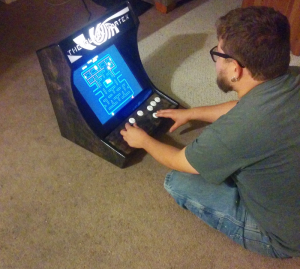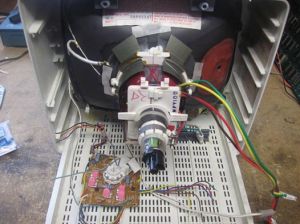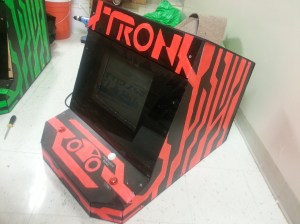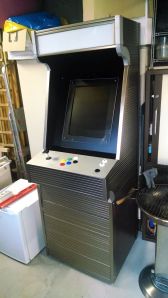This week’s Hacklet is dedicated to arcade games. The arcade parlors of the 80’s and early 90’s may have given way to today’s consoles and PC games, but the classic stand-up arcade cabinet lives on! Plenty of hackers have restored old arcade cabinets, or even built their own. We’re going to take a look at some of the best arcade game-related hacks on Hackaday.io!
 [Brayden] starts things off with his Raspberry Pi Vintage Arcade. The Black Vortex is a tabletop arcade cabinet using a Raspberry Pi, an old monitor, and some nice carpentry skills. Black Vortex uses a Raspberry Pi B+. The extra GPIO pins make interfacing buttons and joystick switches easy. On the software side, [Brayden] is using the popular PiMame (now PiPlay) flavor of Linux built for gaming and emulation. Black Vortex’s shell is plywood. [Brayden] used a pocket hole jig to build a sturdy, cabinet without extra support blocks. A stain finish really works on this one!
[Brayden] starts things off with his Raspberry Pi Vintage Arcade. The Black Vortex is a tabletop arcade cabinet using a Raspberry Pi, an old monitor, and some nice carpentry skills. Black Vortex uses a Raspberry Pi B+. The extra GPIO pins make interfacing buttons and joystick switches easy. On the software side, [Brayden] is using the popular PiMame (now PiPlay) flavor of Linux built for gaming and emulation. Black Vortex’s shell is plywood. [Brayden] used a pocket hole jig to build a sturdy, cabinet without extra support blocks. A stain finish really works on this one!
 Next up, [fredkono] blows our minds with the Arcade XY Monitor From Scratch. [fredkono] repairs classic Atari vector game PCBs. He needed a test monitor for his lab. The original Amplifone and WG6100 color XY monitors used in games like Tempest and Star Wars are becoming rather rare. Not a problem, as [fredkono] is building his own. Much like the WG6100, [fredkono] started with a standard color TV CRT. He removed and rewound the yoke for vector operation. The TV’s electronics were replaced with [fredkono’s] own deflection amplifier PCBs. [fredkono] was sure to include the all- important spot killer circuit, which shuts down the electron guns before a spot can burn-in the CRT.
Next up, [fredkono] blows our minds with the Arcade XY Monitor From Scratch. [fredkono] repairs classic Atari vector game PCBs. He needed a test monitor for his lab. The original Amplifone and WG6100 color XY monitors used in games like Tempest and Star Wars are becoming rather rare. Not a problem, as [fredkono] is building his own. Much like the WG6100, [fredkono] started with a standard color TV CRT. He removed and rewound the yoke for vector operation. The TV’s electronics were replaced with [fredkono’s] own deflection amplifier PCBs. [fredkono] was sure to include the all- important spot killer circuit, which shuts down the electron guns before a spot can burn-in the CRT.
 [Rhys] keeps things rolling with a pair of projects dedicated to arcade controls. His TI Launchpad Arcade Control to USB Interface contains instructions and code to use a Texas Instruments Tiva C launchpad as a USB interface for arcade controls. [Rhys] puts all that to good use in his Arcade Control Panel. The control panel features MAME buttons, as well as the standard 2 player fighting game button layout. He finished off his panel with some slick graphics featuring red and blue dragons.
[Rhys] keeps things rolling with a pair of projects dedicated to arcade controls. His TI Launchpad Arcade Control to USB Interface contains instructions and code to use a Texas Instruments Tiva C launchpad as a USB interface for arcade controls. [Rhys] puts all that to good use in his Arcade Control Panel. The control panel features MAME buttons, as well as the standard 2 player fighting game button layout. He finished off his panel with some slick graphics featuring red and blue dragons.
 [Sarah and Raymond] hosted a Tron:Legacy release party back in 2010. An epic arcade movie calls for an epic arcade game, or in this case, games. 16 table top arcades to be exact. All 16 machines were built in just 6 days. 8 of the machines ran Armegatron Advanced, a networked version of the classic Tron lightcycle game. The others ran a mix of classic games like PacMan or modern bullet hell shooters like Tou-Hou. The cabinets were built from expanded PVC with wood blocks as a support structure. [Sarah and Raymond] custom painted each cabinet with UV black light paint. We love the custom artwork on their personal signature machines!
[Sarah and Raymond] hosted a Tron:Legacy release party back in 2010. An epic arcade movie calls for an epic arcade game, or in this case, games. 16 table top arcades to be exact. All 16 machines were built in just 6 days. 8 of the machines ran Armegatron Advanced, a networked version of the classic Tron lightcycle game. The others ran a mix of classic games like PacMan or modern bullet hell shooters like Tou-Hou. The cabinets were built from expanded PVC with wood blocks as a support structure. [Sarah and Raymond] custom painted each cabinet with UV black light paint. We love the custom artwork on their personal signature machines!
 [Mike] takes us back to the 80’s with Just Another Arcade Machine. Under the hood, this machine uses the standard Raspberry Pi and PiMame (now PiPlay) suite. [Mike] even added a trackball so he could play Centipede. What makes this arcade special is the cabinet. [Mike] found an old wardrobe with that perfect 80’s style metallic strip cladding. [Mike] removed the cladding, and cut up the chipboard frame. He re-assembled things into a stand-up arcade cabinet that looks like it came right out of Sears’ Electronics department in 1985.
[Mike] takes us back to the 80’s with Just Another Arcade Machine. Under the hood, this machine uses the standard Raspberry Pi and PiMame (now PiPlay) suite. [Mike] even added a trackball so he could play Centipede. What makes this arcade special is the cabinet. [Mike] found an old wardrobe with that perfect 80’s style metallic strip cladding. [Mike] removed the cladding, and cut up the chipboard frame. He re-assembled things into a stand-up arcade cabinet that looks like it came right out of Sears’ Electronics department in 1985.
Ok folks, that’s it for another episode of The Hacklet. As always, see you next week. Same hack time, same hack channel, bringing you the best of Hackaday.io!
















100% off-topic but does it bother anyone else the number of ‘open source’ and ‘open hardware’ projects on places like Kickstarter that won’t actually release anything until they’ve hit X target? or until X date?
An immediate example would be https://www.kickstarter.com/projects/1410893208/ambiled-hd-high-definition-ambient-light?ref=category
But it’s just one among many projects.
I know they want to protect their project from being duplicated before they get funding. But it doesn’t really seem in the spirit of open source / open hardware if you’re only going to release it after you’ve sold X amount.
Is it just me or do other people feel the same?
Nah, I kind of understand it. China is fast. If you have to publish your code upfront and your idea is realy good (like real good) chances are someone can start a machine somewhere and beat you to the market.
Let them have their code. They might not even have the code befor the end of the fundung as they are gathering money to just write the actual code (based on maybe a prototype)
Open Source Software in my view, does not give you any rights to anything other as “you can use it”. You have no right/claim that XY has to be released. It is Open Source _when_ it is released. Or am I missing a point here on what your were saying?
What were you planning to change in their code? Did you have something to you wanted to add to it?
Well I’m more interested in the hardware than the software. I already know how it *could* be done but if they’re going to display the open source symbol and say it’s open hardware then I think they should share it.
Otherwise remove all mention of open-source and open hardware and the logos until they’re actually ready to share..
You only need to make available your source code when you are *finally* distributing/selling products that have used other open source products. For a vaporware kickstarter, I would worry more about if the product is real or not first than licensing.
If you develop your own code 100% in house, you can release stuff open source whenever you want.
I think Rhys’ project is going to get duplicated for controls for my MAME cabinet. Been looking for a way to select games without leaving the keyboard attached.
pi as a mame/emulation platform is so tired and boring. not to mention it cant muster accurate playback of a huge majority of games and really isnt that cheap when you compare it’s processing power to other options. why do so many people choose to use them?
For blog cred.
Also recently rpi and arduino have become like search engine markers for information. For example, if you are looking into interfacing something weird and don’t want to start from scratch and reinvent the wheel, adding “arduino” to your search terms may actually bring up some reusable stuff, or even some well researched information.